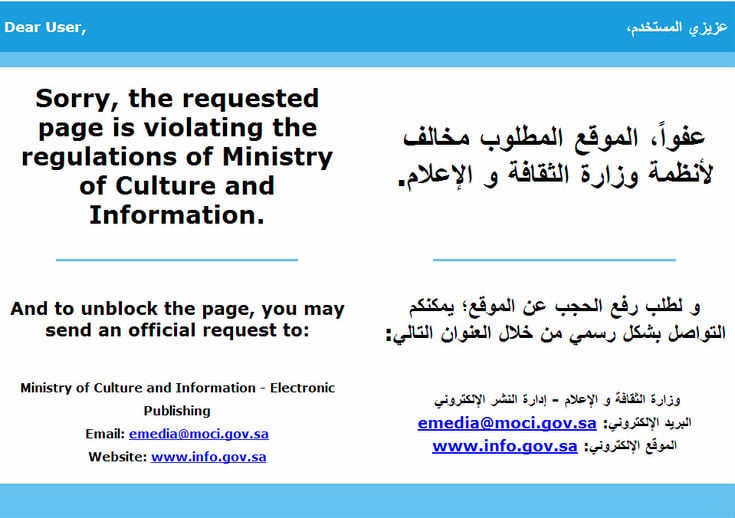TorrentFreak Email Update |
| Saudi Arabia Government Blocks The Pirate Bay (and More) Posted: 02 Apr 2014 02:04 AM PDT
Without prior warning or official announcement, the country’s Ministry for Culture and Information ordered local ISPs to block access to The Pirate Bay. In addition, several other torrent sites were also censored, including Torrentz.eu and Rarbg.com. The reason for the blockade remains unknown, but piracy concerns seem plausible as the measures are coming from the Ministry of Culture, and not the Communications Commission which administers the country’s regular filters. As can be seen below, the blocking notification for The Pirate Bay is also different from the green notice that appears for sites that are blocked in violation of the Islamic religion.  Interestingly, the measures come two months after several copyright holder groups urged the U.S. Government to place Saudi Arabia on its priority watchlist. MPAA, RIAA and others suggested that the country isn’t doing enough to stop online piracy. The blockade is currently active on nearly all ISPs, but TF has learned that Zain customers can still access the site. Zain does block Pirate Bay’s porn category, but that’s nothing new. The Pirate Bay is among the 50 most visited websites in Saudi Arabia, and the blockade has caused quite a bit of uproar on social media. The topic is currently trending on Twitter where many people are voicing their frustration.  However, as with all censorship attempts there are plenty of ways to circumvent this blockade. The easiest option at the moment is to simply use the https version of the site. Other workarounds, such as VPNs or Pirate Bay proxies, work fine too. The Pirate Bay team is not impressed by yet another country blocking access to their website. A few months ago they released Pirate Browser which allows users to access the site without restrictions. It has been downloaded millions of times since. Source: TorrentFreak, for the latest info on copyright, file-sharing and anonymous VPN services. |
| Mobile Music Piracy More Popular Than Torrents and Cyberlockers Posted: 01 Apr 2014 10:44 AM PDT
NPD’s Senior Vice President, Industry Analysis, Russ Crupnick informs us that mobile music piracy through apps has outgrown traditional P2P file-sharing and direct downloads. “In terms of the number of internet users doing a variety of music sharing activities, downloading from mobile apps is the most popular,” Crupnick tells TF. The data comes from unpublished research, which was the first to include statistics on the usage of mobile apps to download music. Quite surprisingly, mobile piracy comes out on top right away. It is estimated that in the United States 27 million people downloaded at least one music track via their mobile over the past year, mostly without permission. This trumps all other forms of online piracy. By comparison, 21 million people used traditional P2P sites such as The Pirate Bay to download music. For other media types the results are different, but the findings signal an interesting trend. According to NPD mobile apps are, as one would expect, most popular with younger consumers. There are a variety of reasons for the mobile piracy explosion, but the research firm believes that increased usage of smartphones and apps among Millennials is a major driver. “My guess is there is an underground buzz network about music apps that is fueled by teens and Millennials,” Crupnick says. NPD believes that it’s important for copyright holders and app platforms to work together to tackle this problem. While some people may know that these apps are unauthorized, the fact that they appear in iTunes or Google Play may give them an air of legitimacy. “Lots of things on the web are free or ad-supported, including some entertainment content. I'm sure some users are quite aware that there is music that is not legally distributed on these apps, but others may not be as educated,” Crupnick tells us. “If it's on an app store, it must be ‘OK’. This is where the music industry and technology companies have an opportunity and maybe an obligation to work together to make sure consumers understand, and artists get compensated,” he adds. These last comments appear to signal a new working territory for the music industry’s anti-piracy initiatives. Until now, there hasn’t been a major campaign against “infringing” apps, but this is bound to change in the near future. Whether a crackdown on apps will be enough to counter the current mobile piracy trend has yet to be seen. In addition to pirate apps, several unauthorized MP3 indexes have also developed mobile versions, which will prove much harder to deal with. Source: TorrentFreak, for the latest info on copyright, file-sharing and anonymous VPN services. |
| You are subscribed to email updates from TorrentFreak To stop receiving these emails, you may unsubscribe now. | Email delivery powered by Google |
| Google Inc., 20 West Kinzie, Chicago IL USA 60610 | |
 Blocking The Pirate Bay has become quite common around Europe in recent years, and today this practice spread to Saudi Arabia.
Blocking The Pirate Bay has become quite common around Europe in recent years, and today this practice spread to Saudi Arabia.  In recent years the music industry ‘s battle against piracy mostly focused on torrent sites, cyberlockers and unauthorized MP3 indexes. However, new research from the industry analysis firm
In recent years the music industry ‘s battle against piracy mostly focused on torrent sites, cyberlockers and unauthorized MP3 indexes. However, new research from the industry analysis firm